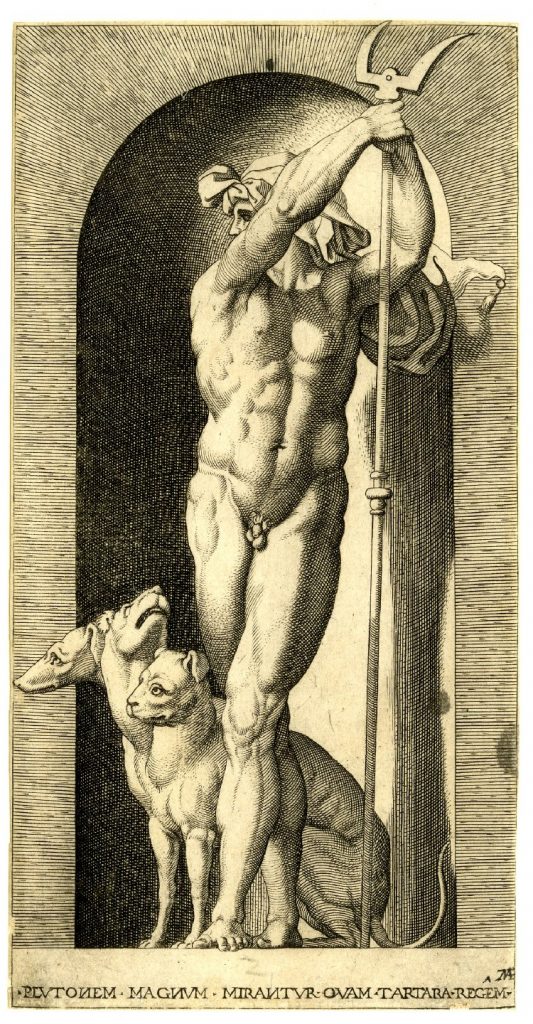More often than not, ancient Greek mythology (religion) served to explain a series of legends. Different from modern religions such as Christianity, Judaism, or Islam, ancient Greek religion was an anthropomorphic polytheism, meaning that ancient Greeks believed in a multitude of individual divine figures that took on human forms and emotions.1 Furthermore, ancient Greek mythology lacked much of the asceticism and mystical enthusiasm that is more commonly seen in modern religions. Most of the highly developed anthropomorphic and comparative rationalism of the ancient Greek religious thought can be accredited to Homer with the aid of his Iliad and Odyssey.2
The people of the ancient Greek civilization were often in a state of weakness under the power of nature; therefore, they relied heavily on the divine individuals of Olympus. Why? They believed that the forces of nature were under the control of their gods. In short, the relationship between humans and divine beings was that of a retribution justice.3 If humans did anything to offend the gods, then those gods would strike back in some sort of fashion to restore justice.4 Therefore, humans were constantly looking to please the gods in fear of their wrath.
Out of the ancient Greek mythology came the god of the dead and the underworld, Hades. Hades had five other siblings: Zeus, Poseidon, Demeter, Hera, and Hestia, and they were all children of Cronus and Rhea.5 After defeating their parents (the Titans), Hades drew lots with Zeus and Poseidon to gain their respective domains. Hades was commonly thought to be a cold god, but he was never considered to be an evil divine figure. Furthermore, it is important to note that his realm, the underworld, should not be associated with the hell of Christianity.6 However, Hades was for the most part feared by all. Another name for the ancient Greek god was Ploutos and later adopted by the Romans as Pluto.7

The god of the underworld was the husband of Persephone (Zeus’s and Demeter’s daughter). Although she was Hades’ wife, she only lived with him during the winter time.8 Persephone was the divine goddess of agriculture and fertility. Therefore, the ancient Greeks accredited the change in nature (winter) to Persephone moving to the underworld. Persephone was unable to stay with Hades at all times due to interference from her mother Demeter. Zeus, however, was okay with the marriage of Hades and Persephone. Therefore, in order to set up the marriage, Zeus had to trick Persephone, so she could be abducted by Hades.9 However, Demeter interfered, and that is why Persephone spends half of the year with Demeter and the other half with Hades.
Furthermore, it is important to note the Greek perspective of the afterlife. Perspectives about the afterlife varied from each other based on their region in Greece as well as their time period in Greek history. The consensus was that the underworld was neither heaven nor hell.10 The sense that exists within Christianity, for example, was not present during the time of the ancient Greeks. Although Tartarus was present as a location within the underworld, the Greeks would not compare it to the equivalent of Christian hell. The way the Greeks saw it, the underworld was a place that everyone ended up after death.11 However, there were a few, including the philosopher Epicurus, that believed that the underworld did not exist at all. He believed that when the body died, the soul died with the body as well.12 A good portion of Greeks refused to believe such a pessimistic perspective of the afterlife. However, even the Greek traditional perspective of the underworld was not as popular despite many Greeks believing in it.
- Funk & Wagnalls New World Encyclopedia, 2016 s.v., “Greek Religion and Mythology.” ↵
- Funk & Wagnalls New World Encyclopedia, 2016 s.v., “Greek Religion and Mythology.” ↵
- Funk & Wagnalls New World Encyclopedia, 2016 s.v., “Greek Religion and Mythology.” ↵
- Funk & Wagnalls New World Encyclopedia, 2016 s.v., “Greek Religion and Mythology.” ↵
- Salem Press Encyclopedia, January, 2015, “Hades (deity),” by Joseph, Michael, DMin. ↵
- Salem Press Encyclopedia, January, 2015, “Hades (deity),” by Joseph, Michael, DMin. ↵
- Salem Press Encyclopedia, January, 2015, “Hades (deity),” by Joseph, Michael, DMin. ↵
- Salem Press Encyclopedia, January, 2015, “Hades (deity),” by Joseph, Michael, DMin. ↵
- Salem Press Encyclopedia, January, 2015, “Hades (deity),” by Joseph, Michael, DMin. ↵
- The Greenhaven Encyclopedia of Ancient Greece, 2007, s.v. “Underworld,” by Robert B. Kebric. ↵
- The Greenhaven Encyclopedia of Ancient Greece, 2007, s.v. “Underworld,” by Robert B. Kebric. ↵
- The Greenhaven Encyclopedia of Ancient Greece, 2007, s.v. “Underworld,” by Robert B. Kebric. ↵



186 comments
Madison Downing
What I really liked about your article is how you’re not afraid to state how even though the Greek religion is seen as mythology now, it was believed just as much as our common religions today. Honestly, it wouldn’t be shocking if a thousand years later our religions of Christianity, Judaism, Islam, and others are seen as myths. I always find it funny how today when people think of Hades they see him along the lines of the Devil but that isn’t how he actually was descripted as. He might have been cold but not evil, just like you explained in your article. I was so happy when reading your work how you explained that point because not everyone really understood that based on the fact its different times. I truly liked your work and I hope you wrote more articles!
Tyanne Pearcy
What always interest me about Greek mythology is the relationship between the humans and the gods. The humans seemed more scared of the Gods rather than appreciative of them. Which brings Hades into view as he was the most feared out of them all. I never knew that Hades had a wife and that Zeus had to trick her so that Hades could capture her. I also thought it was interesting that even though he was the God of the underworld, that didn’t refer to hell as it does in Christianity.
Alexandra Lopez
This article was very informative about the topic of not only on Hades but the roles of those who prayed to the Greek Gods as well. I did not know Hades was not evil or the underworld is not in comparison with the Christianity version of hell. Reading this article corrected my past insertions on this topic and it was well written by the author.
Kathyleen Lauriano
When you think of Hades you obviously think horrible thoughts. He wasn’t always the bad person, all he wanted was respect from his brothers. What I found interesting was that Zeus had to trick Persephone so she could be abducted. Sounds crazy. I honestly didn’t know that till I read this article. All in all the article was well written and was very informative. Great job!
Jose Fernandez
I think reading this type of articles are really important because we tend to forget history and mythology from other cultures. The article caught my attention because it offered a description of the “true” Hades; not the Hades that we see in Hollywood movies. I also liked the paragraph on the afterlife at the end of the article. It is really different from what I am used to.
Gabriela Murillo Diaz
The article covers the Greek mythology and how it attempts aspect of life through these legends. Hades is discussed in the article and his importance to Greek mythology. The topic itself is very interesting because mythology has a diverse explanation for the creations in the world. The article could have been more descriptive if it was going to be so short.
Peter Coons
I had always assumed that Hades was just a version of what Christians call Hell, but in an earlier telling. This article does a very good job at making the difference between the place and the god. Beyond this, I did not even know the complexities surrounding marriage with the gods. Who would have thought that it would be that convoluted just to say two gods were married.
Kacey Diaz
I think the author did a really good job in painting a picture of Hades that is not as dark and cold as I imagined him to be based off of prior knowledge. This subject as always been interesting for me and this put a different light on Hades for me. I would think of him as dark and cruel but this article counters that in a way by simply saying he was cold but the underworld isn’t how you might imagine it.
Kacey Diaz
I think the author did a really good job in painting a picture of Hades that is not as dark and cold as I imagined him to be based off of prior knowledge. Greek mythology as always been interesting for me and this put a different light on Hades for me. I would think of him as dark and cruel but this article counters that in a way by simply saying he was cold but the underworld isn’t how you might imagine it.
Mason Meza
Greek mythology has always been very interesting but I know very little about it. Yes I have read some books on it but I still never fully understood it. This article explained to me who Hades was and what he did. He was the ruler of the underworld, so he was an evil Greek God. Hades who also was known as Pluto, wasn’t really a bad guy, he was just cold.